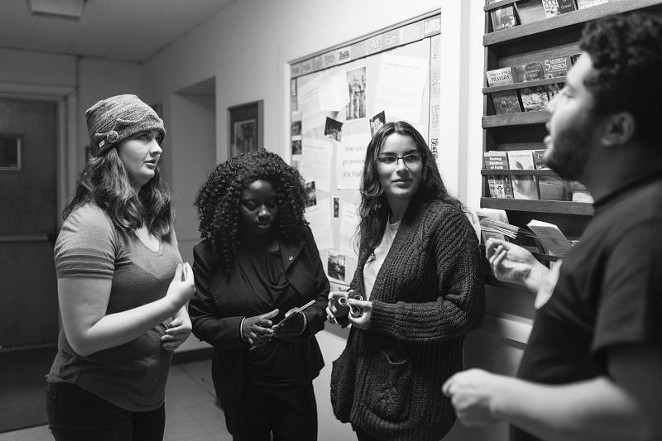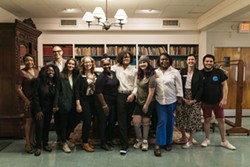Deep Center is in the middle of a major moment.
The nonprofit has been around for 11 years, going into Savannah’s middle and high schools to host creative writing workshops and build our community.
In that time, Deep’s young people have written fearlessly and exposed Savannah’s inequity through their clear-eyed discussion of the issues they themselves face. What better way to see the world through a child’s eyes, right?
Adults have heard so often, “That’s just the way Savannah is,” dismissing the systemic inequity as something that just happens.
Deep knows how Savannah is because of the children it serves, but they’re not content with letting the broken system continue to function. Instead, they’re turning it on its head.
“Deep Center is doing policy work because our young people have led us to this point,” says Megan Ave’Lallemant, Director of Adult Programs. “Young people would be speaking amazing truth, and then we didn’t have the next right action step except to continue writing and performing. So we realized that we needed to also start to address the systems that are impacting our young people.”
On Oct. 8, Deep released its first set of policy recommendations in a report written with Kate Blair of Savannah/Chatham CASA and assisted by Dr. Kevin Burke of the University of Georgia. The report includes six policy recommendations, focusing on the school-to-prison pipeline.
The school-to-prison pipeline is defined by the ACLU as a trend of children being funneled out of public schools and into the juvenile and criminal justice systems as a result of schools failing to address the root cause of why a student doesn’t perform well, like a history of poverty or neglect.
Ave’Lallemant, with Community Engagement Coordinator Raphael Eissa, lead the Action and Research Team, which used conversations and lived experience to build this study. Their focus this year was on discipline in schools, a concern raised by Deep kids.
Ave’Lallemant and Eissa dove into research on discipline policies and accountability, partnering with the Dignity in Schools Campaign, whose model code of conduct was instrumental in Deep’s recommendations for a code of conduct in schools.
“We were able to pull a number of different recommendations that we thought were applicable to our own context—for example, the abolition of vague, catchall terms in the code of conduct such as defiance or disobedience, which represent a large bulk of the disciplinary violations that are committed,” says Eissa.
“Their model code of conduct has a human rights framework, so it centers the humanity of young people in the codes they recommend,” adds Executive Director Dare Dukes. “Overarching values to find ways to find ways to call young people into the community, rather than push them out.”
A clear, concise code of conduct can eliminate the subjective punishment of young people—the report notes that black boys and girls are the most likely to be harmed by an ambiguous discipline policy.
To move away from antiquated codes of conduct, a power shift is necessary. In Deep’s discussion spaces, points out Eissa, titles are eliminated in favor of the more colloquial use of someone’s first name.
“In order to reduce power dynamics that might exist between adults and youth, we encourage people to reference each other by first name, to drop titles,” says Eissa. “We find that when we introduce Deep culture, it can be a shock to people in power.”
That shock just shows how subversive Deep is to the status quo. Society’s need for respecting elders is so ingrained into our society that kids grow up calling older folks “ma’am” and “sir.” Anything less feels like an affront, as Coco Papy, Director of Development and Communication, describes.
Papy talks about a huge win for Deep after Police Chief Minter and Major Gavin came looking for a conversation about how to talk to young people. Ave’Lallemant and Eissa welcomed them into the space, but on the condition that they needed to be in plainclothes and unarmed—a request that the young people themselves made.
“You can see there’s a very obvious push and pull,” says Papy. “I think it can be perceived as a form of disrespect, but for us, it’s very much a way of equalizing the field and ensuring that symbols of power are not necessarily in a space where you’re trying to have people be as honest as possible.”
Those spaces are even more crucial for youth, whose voices often aren’t heard in places often reserved for adults, like candidate forums. There’s a big moment of duplicity happening in our world right now: children are heralded as The Future, but not taken seriously. Deep gave some power back to kids by facilitating a youth-led forum on Oct. 25.
Four Deep students led the forum, which invited candidates for mayor and for aldermen at large. Ave’Lallemant and Eissa sat in on the forum but didn’t participate beyond keeping time.
Prior to the forum, Deep staff helped the kids do research that would help them feel comfortable asking good questions and to push back if they didn’t think their question was being answered.
“We’re so good at centering youth that we often decenter the structures we put in place to lift youth up,” says Dukes. “I say this because there are a lot of spaces in Savannah where folks will put young people across the table from people in power and say, ‘Okay, ask them questions!’ Without support or conversations with the people in power about what it means to be in that space, youth can often be tokenized and, while being visibly put in a powerful position, actually made less powerful.”
“What we’re really doing is training young people in civic engagement and all the different ways that could look,” says Papy. “A lot of it is a very deep learning process, all these issues overlap, but there are ways of supporting them through this process without projecting any one personal opinion or belief on anything. Ultimately, what we’re focused on is our young people learning how this process works so they can be better, involved, and informed citizens because that’s what we need.”
Papy shares that the elected officials and candidates at the forum said that the young people asked some of the best questions they’d heard all election season.
So, what’s next for Deep?
Recently, they were awarded a grant from the Hewlett Foundation to examine school climate in Savannah. The grant was written by Dukes, with considerable input from Savannah-Chatham County Public Schools superintendent Dr. Ann Levett and former mayor Otis Johnson.
Papy emphasizes the work that Levett and Johnson have done, and that Deep’s policy recommendations
“I think something we felt was really important to do was adopt a ‘yes, and’ approach, not an ‘either or,’” says Papy. “Because we released this brief does not mean things aren’t already happening. We want to give credit to people like Judge Lisa Colbert and Dr. Levett for pushing this work forward. How can we continue to build on that work? Institutions are massive things, and it takes a lot to shift them even the slightest direction.”
Currently, Eissa and Ave’Lallemant are working on the new iteration of the Action Youth Team, which could take their work in a totally different direction based on what that group of young people values. Papy addresses the recent CAT study breakdown as something that’s on the minds of their kids, but undoubtedly, issues will shift to the forefront. Deep has plenty of time and lots more work to do.
“The candidate forum itself was very much the pre-beginning. This is going to be a campaign,” asserts Eissa. “This isn’t just a conversation. Our young people will be following up with whoever is elected into office to ensure that these conversations move beyond the point of talking and moving into action, into adopting legislation and policies that can codify all that we and the young people are recommending.”
Deep is also working to continue conversations and hold adults more accountable.
“In terms of narrative change, we’re continuing to work to hold up positive representations of youth of color healing, growing and thriving, both individually and through collective action, to very intentionally disrupt the crime and punishment narrative that Savannah sits inside of around working-class youth of color,” says Dukes. “It’s time for Savannah to start holding adults accountable, not just young people. When you tell stories about young people and their challenges in Savannah, the burden of change is always on young people—‘What are they doing to lift themselves up?’ We’re asking, ‘What are adults doing to clear that path?’”



